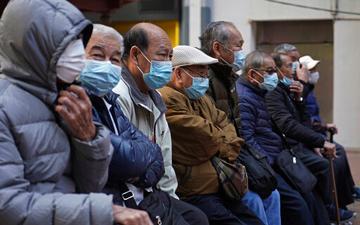
AP Photo/Kin Cheung
An earlier version of this article was published in the San Francisco Chronicle on February 5, 2020. Margaret R. McLean, Ph.D., is the associate director and director of Bioethics at the Markkula Center for Applied Ethics at Santa Clara University. Views are her own.
Originating in China, novel coronavirus has been confirmed in over two dozen countries with 11 confirmed cases in the United States, four in the Bay Area, as of this writing. The State Department has warned Americans not to travel to China, where more than 17,000 people have been diagnosed and over 350 have died. Anyone entering the U.S. who has been in China’s Hubei province in the last two weeks is subject to a two-week quarantine. For the first time in over 50 years, a federal quarantine order was issued for the first 195 Americans evacuated from Wuhan.
I am not the only one to note the striking resemblance of this global health emergency to the 2003 outbreak of another novel coronavirus, SARS. SARS coronavirus also began in China and resulted in 8,093 confirmed cases of severe acute respiratory syndrome, with 774 fatalities in 17 countries. The novel coronavirus has sickened more people but, so far, is less deadly than its predecessor.
SARS taught us a great deal about public health preparedness and how to respond to novel viral outbreaks. It also made abundantly clear the critical importance of ethical preparedness — lessons we need to revisit and relearn now.
Containing SARS was in many ways a noteworthy public health achievement that relied on well-tested precautionary measures — think hand washing — and rigorous infection control — think isolation and quarantine. But despite ultimate success, the SARS response laid bare the hidden risk of being ethically unprepared.
Outside of Asia, the city most impacted was Toronto, which suffered two SARS outbreaks lasting a total of 6 months and killing 42. After the crisis passed, researchers at the University of Toronto Joint Centre for Bioethics observed that as the virus spread and mandatory quarantine and isolation measures took hold, people became progressively worried about what values were guiding such public health decisions. Were the responses of officials coming from fear and expedience or a concern for the public good? Decision makers found themselves forced to choose — and choose quickly — between protecting individual freedom and guarding the common good.
Toronto pointed to the importance of developing an ethical decision-making framework, not in the moment of crisis but ahead of time, so that public health officials and government leaders can make well-informed, value-based decisions. Decisions must be transparent and rooted in what those most affected would want done. Public conversations regarding hard choices ideally occur before, not after, people are jostling at the emergency-room door.
Timely, transparent, publicly informed decision making bolsters public trust, eases fear and results in acceptance of decisions made in the interest of the common good — even restrictions on movement. SARS taught that treating people fairly in times of rampant uncertainty and fear is critically important to social stability and the success of disease containment.
Our primary ethical mandate in the face of any disaster — be it infectious disease or volcanic eruption — is to maximize preparedness so as to minimize harm and keep society functioning. This conscientious planning requires operational preparedness: What do we do? How do we do it? It also requires ethical preparedness: Why must we do what we must do?
Preparedness for next time begins now on the front lines of the coronavirus outbreak. SARS taught us to be transparent and fair. What must we learn from this novel virus?
